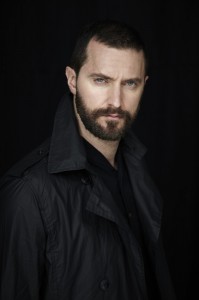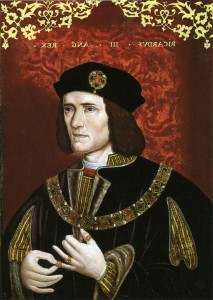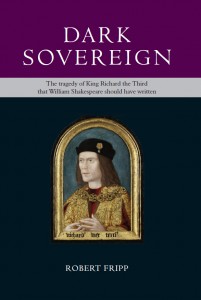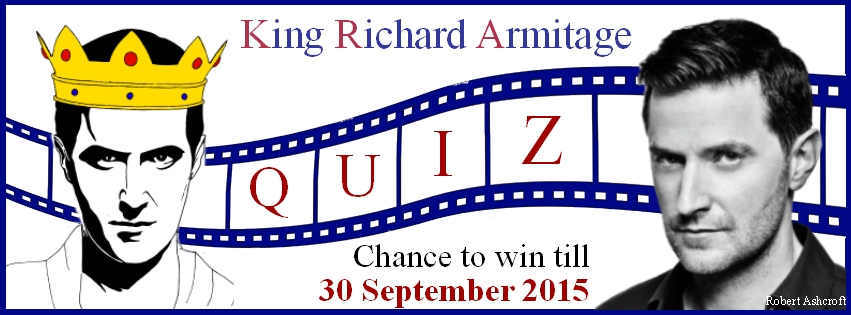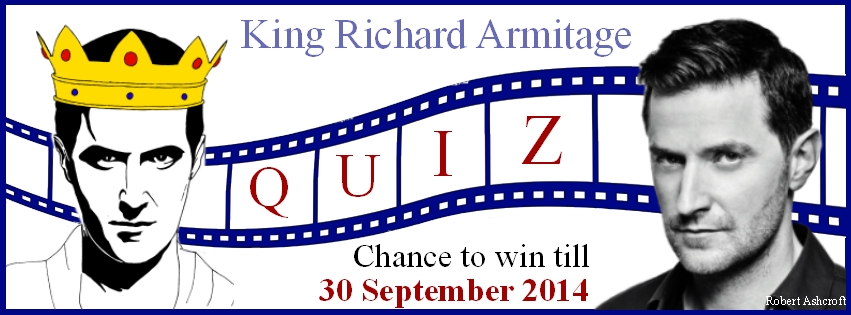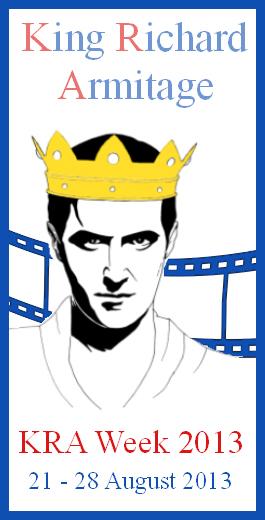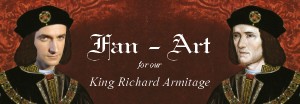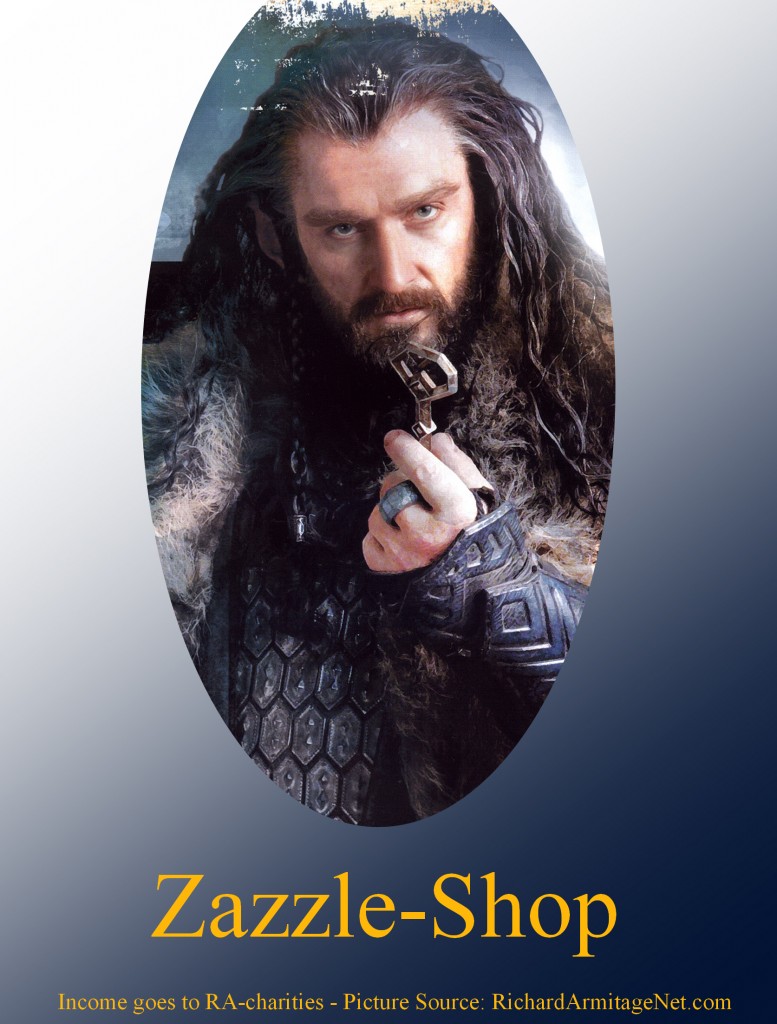Maria Grazia of Fly High and King Richard III
The reason why you are our guest today, Maria Grazia, is that your main blog, FLY HIGH!
features pages dedicated to Richard III and to Richard Armitage. You’ve been writing about RA’s career and work for a while now and you’ve started an interesting series focused on Richard III and his history – with posts written by you and by experts – recently (Link list follows below the interview!). You seem to be keen on both Richard III and Richard Armitage, hence, you are the ideal guest for this site. Welcome!
Thanks for inviting me. You are right I have got a real interest in both the men. I really hope Richard Armitage will achieve his dream of shooting/producing a TV series about Richard III and that it could contribute to the spreading of a new, more positive image of the wrongly despised King of England.
What was it that brought you to want to know more about King Richard III, who in literature mostly got a description of being an ugly, hunchbacked and crippled King?
I owe my enthusiasm for the Ricardian cause and my extraordinary quest in search for the real Richard III to a novel: Sharon Kay Penman’s The Sunne in Splendour. It was such a revelation for someone like me who had always and only read Shakespeare’s tragic portrait of him as the ultimate villain. An incredibly powerful characterization but so distant from the reality, I bet.
After that novel, I’ve read other interesting ones based on a completely positive image of Richard III: Josephine Tey, The Daughter of Time and Anne O’Brien’s The Virgin Queen.
The ugly monster who killed his nephews to get to the throne was substituted by the very humane figure of a complex, loyal, dutiful man.
Was the fascination more because of the image you had because of Shakespeare or were other factors more important?
I’ve never been so interested in Shakespeare‘s Richard III, actually. His historical plays are the ones I know and appreciate the least. I prefer tragedies like Hamlet, Macbeth, Romeo and Juliet, Othello or comedies like The Merchant of Venice, Much Ado about Nothing, Twelfth Night or As you like it. Smart dramatist and wonderfully gifted writer as Shakespeare was, he fully achieved his aim with the Tudor propaganda: fiction replaced history and it has gone on like that for centuries. Richard Plantagenet has been Shakespeare’s hunchbacked and crippled king for so many and for so long. But now I’m fascinated by the contrast between the documents discovered later on – with the resulting new hypothesis – and Shakespeare’s account of those facts.
Can you share a very special fan-event / moment determining your interest in King Richard with us?
Well, as you may guess, everything started when I heard Richard Armitage talk about his Richard III project. I had been following his career for a while after watching him as John Thornton in North and South, when I happened to watch an interview for the promotion of Robin Hood season 2, in which he talked about a different image of Richard III in a script he was working on. I was struck by lightning: “Richard III was not wicked?!? What is this all about”?
So I started researching and I discovered The Ricardian Society and their cause.[Annotation: More information and contact details of the Richard III Society in this article and page on KRA.]
I’ve listened and read more of Richard Armitage about Richard III (the interview in the Venetia audiobook, an interview for Strike Back on the radio and , especially the interview at Vulpex Libris) until I decided to buy and read The Sunne in Splendour and … I got in love with Sharon Kay Penman’s Dickon. Now, I can’t actually see Richard Armitage (an adult man) as young Dickon, but I would love to see him as Richard III in the last years of his life.
What is a special aspect / character trait of King Richard III which fascinates you?
His being loyal to his brother, King Edward IV, to his duties as Duke of Gloucester and Lord of the North, to his family. Then, the picture I have in my mind is biased by the romantic Dickon Ms Penman portrayed, of course, but I can only imagine him as a very sensitive and thoughtful husband and father. Just have a look at his concerned look in his portrait: that can’t be the look of a wicked person.
Did you see some of the places where King Richard lived, stayed, was?
Oh indeed I did! And it was memorable. I went to Yorkshire in July and the best moment of the Ricardian tour was our visit to Middleham Castle. It was so thrilling, even moving. I was touched and sad during that visit. The place was bleak and windy. I so wanted to have glimpses of the happy moments Richard had lived there, but it was not easy. Then I was at Sheriff Hutton and at Bosworth. I wrote about that experience on Fly High and you can see also some of my pictures in “On the Footsteps of Richard III”.
What about you and … Richard Armitage?
Richard Armitage is my favourite actor and my “one weakness“. Everything started in August 2008 when I decided to buy a DVD online titled NORTH AND SOUTH (BBC 2004). I wanted to use it in my lessons about Mrs Gaskell and her novels. It was the end of my old serious prof-style life and the beginning of a half – serious addiction to everything this man happens to do. And he has surprised me in many ways so far: he was young Monet (one of my favourite painters!), wicked Lovelace in Richardson’s Clarissa, a handsome workaholic doctor in The Golden Hour, evil Gisborne in Robin Hood, tender John Standring in Sparkhouse, dashing treacherous John Mulligan in Moving On, lovely Harry J. Kennedy in The Vicar of Dibley, but last and definitely not least, he miraculously landed on my favourite BBC series, SPOOKS as Lucas North. I know this list is not complete but these are just the first roles which came to my mind in no particular order. I’m glad he’s going to be under global spotlight as Thorin Oakenshield in The Hobbit and would eagerly like him as King Richard III.
Do your family / friends / colleagues share your admiration for King Richard III?
I’ve got few friends who share my interest in Richard III but no colleague or member of my family, unfortunately. However, thanks to my blog I’ve had the chance to meet other admirers from all over the world!
Maria Grazia lives in Italy, not far from Rome. She teaches English as a foreign language to teenage students and English literature and she loves her job. She became a blogger to help her students and support them with useful materials in 2008 and blogging has become her main hobby. Fly High is her main site about books, art, period drama, movies, classic literature, historical fiction and Richard Armitage. She’s also got a Jane Austen-dedicated page, My Jane Austen Book Club, where she “meets” Janeites to discuss everything Austen. She’s married and has two teenage sons.
Maria Grazia and her articles about King Richard III on FLY HIGH:
Maria Grazia online:
- Twitter – SmaryG
- Facebook –Fly High
- Facebook – My Jane Austen Book Club
- Maria Grazia on paperblog
Why Would King Richard Ride on a Badger? – Or Rather a Hog?
If you read our last post, you perhaps wondered, why in the “Horrible History” video about Shakespeare’s version of King Richard, he would choose a badger instead of a horse to ride away from the battlefield at Bosworth.
By chance, I found a reference, which perhaps is quite well known for all English readers here, but for me was totally new.
The text brings King Richard III in connection with quite a few animals:
Sir William Collingbourne (1435 – 1484) wrote the following verse:
The Rat, the Cat and Lovell the Dog,
Rule all England under the hog.
(Original note, pinned to the door of St. Pauls Cathedral on 18 July, 1484:
the Catte, the Ratte and Lovell our dogge
rulyth all Englande under a hogge.)
The poet got executed because of this ‘offensive’ couplet. Why, is not immediately understandable for us now, when the “Horrible History” episode could bring in a badger, without causing any offence, but perhaps just a slight rising of the eyebrow in astonishment.
The for people of King Richard’s time well understandable connection and irony becomes clear, when we exchange the animals with the dignitaries, Collingbourne intended with those names:
Rat = royal adviser Sir Richard Ratcliff
Cat = minister Sir William Catesby (Chancellor of the Exchequer during King Richard’s reign)
Dog = Viscount Lovel (His family’s heraldic symbol was the wolf)
Hog = King Richard III (King Richard III’s banner animal, the boar, is re-interpreted and made into a tame hog.
Collingbourne got his place in history for this small witticism, as the one who got executed for the least cause, as Tudor author Edward Hall puts it.
That Collingbourne indeed meant to offend King Richard III with his verses, becomes clear when one has a closer look at the hinted meaning in his witticism.
The boar, the chosen banner animal of King Richard, in Medieval times was an animal which was treated with greatest admiration, either for its strength, endurance, intelligence and fierce way as a fighter during hunts as well as its uncompromising care for its offsprings. It was greatly feared and hunters did not approach a boar on their own, but only dared to hunt a boar in larger groups and still it was deemed one of the most dangerous animals to hunt and brought the hunter who killed one greatest admiration.
To change that into a tame animal, which was by far not as highly valued for its attributes, though it was a useful creature, was a clear offense of its own, which mostly evades ouf perception of the case today, where most of us never came close to either a hog or a boar.
Collingbourne not only attacked the king, but also his three closest confidants, who all three profited greatly from their connection to Richard III during his reign, but who also loyally supported him and died for their king at or shortly after the Battle of Bosworth.
But closer research into the case reveals more than just a witticism.
Collingbourne had been part of a bigger conspiracy in favour of Henry Tudor, which was stopped and he, as leader of the conspiracy, consequently was executed in the year 1484. He had ‘published’ more than one witticism on the door of St. Pauls Cathedral and was famous for his short notes criticising the King and his confidants. He also stood in direct correspondence with Henry Tudor, encouraging him to land at Poole to forcibly take the crown from King Richard III, as indeed Henry Turdor later did at Bosworth.
(The badger, deriving from a mentioning in the “Black Adder” depiction of King Richard III, is perhaps comparable to a boar in size. At the time of King Richard III it would have been even more offensive than a hog, as it is a rather easy to hunt animal, though normally one would not want to do that at all, as the meat of badgers, except of very young ones or in early spring, is of no use, because the intensive odour of the fat makes it nearly unedible. That it also hides in holes in the earth would have increased the unsuitability of that animal to bring in connection with a king.)
Resources:
Wikipedia is an invaluable source and even solved the error, my printed source (therefore not named, as it is wrong in that case) held, by naming the culprit and author of the verses not Collingbourne, but Collingham.
Some articles of interest are:
Article is loosly refering to Grimm’s Encyclopedic collections (German invaluable sources of all symbolism and hidden meaning behind signs and images of any kind, though the brothers are better known for their fairy tales.)
Important notice to all signers of the petition:
We have currently accumulated over
60 unconfirmed signatures
of the petition (which are not included in our signatures count in the sidebar!).
We fear, this high number might be due to the delivery of the mail into your spam-folder, as the confirmation mails contain a return-link to co-ordinate the feedback.
To all unconfirmed signers, we will send out the confirmation mail again tomorrow (19th of January, 2012). Please check your e-mail and eventually your spam-folder.
Thank you !
Shakespeare – What he Should Have Written …
Shakespeare’s “Richard III” is well or mostly not so well remembered from school.
It is common knowledge that Shakespeare was very creative with forming historical detail anew to reach the greatest effect for his plays, so he cannot be seen as a reliable source for the times of King Richard III.
That even King Richard III himself has strong objections against Shakespeare’s version of the story, shows this funny little video by “Horrible Histories”:
But the endeavor to write, what Shakespeare should have written if he had been more true to real events, nobody undertook before
Robert Fripp
Robert Fripp and his work “Dark Sovereign” are presented in an article by Maria Grazia on her blog Fly High!.
The book can be ordered via Amazon and is available in print and as Kindle version.
Amazon.com
Amazon.ca
Amazon.co.uk (Affiliation link)
Amazon.de (Affiliation link)
(As far as possible, we link to affiliate programs and the income goes to charities supported by Mr. Armitage. Please also consider the affiliation links at RichardArmitageNet.com for Amazon U.S. and U.K., where the income also goes to RA’s charities.)

